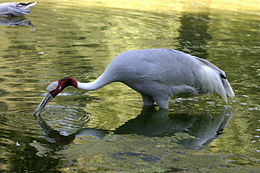Grus (bird)
| Grus | |
|---|---|
 |
|
| Sarus crane, Grus antigone | |
| Scientific classification | |
| Kingdom: | Animalia |
| Phylum: | Chordata |
| Class: | Aves |
| Order: | Gruiformes |
| Suborder: | Grui |
| Family: | Gruidae |
| Genus: |
Grus Brisson, 1760 |
| Species | |
|
10, see text |
|
10, see text
Grus is a genus of large birds in the crane family. The genus name is from Latin; grus, "crane". Grus was first applied to the grey-winged trumpeter, but this was overlooked for many years so it was retained for the cranes as a nomen conservandum.
The HBW/BirdLife and Clements checklists split this genus into five, with the Siberian crane in the monospecific genus Leucogeranus; the sandhill crane, white-naped crane, sarus crane, and brolga in the genus Antigone; the demoiselle crane and blue crane in the genus Anthropoides; and the wattled crane in the monospecific genus Bugeranus, leaving only the red-crowned, whooping, common, hooded, and black-necked cranes in the genus Grus.
The Cuban flightless crane, Grus cubensis, became extinct in the Quaternary, but probably before human settlement of Cuba.
The fossil record of the genus stretches back some 12 million years or so. A considerable number of prehistoric species are known, with the oldest, Grus miocaenicus (Middle Miocene of Credinţa, Romania) perhaps not a crane but a junior synonym of the swimming-flamingo Palaelodus ambiguus; ("Grus" problematica certainly is). The Mediterranean Grus primigenia was hunted by stone age humans.
Several other fossil gruiforms are now considered not to belong here. "Grus" prentici is now in Paragrus, "Grus" princeps, "Grus" excelsa and "Grus" hordwellianus are placed in Palaeogrus, and "Grus" excelsa in Balearica. "Grus" marshi belongs into Aletornis
...
Wikipedia
